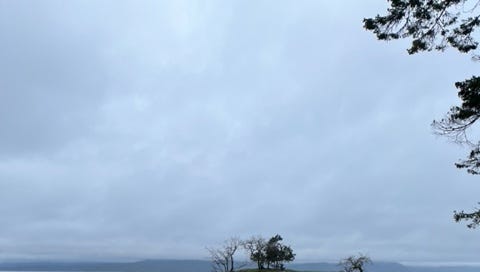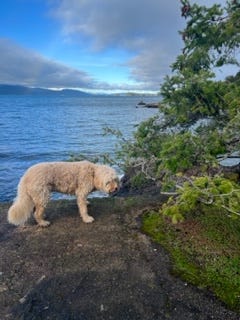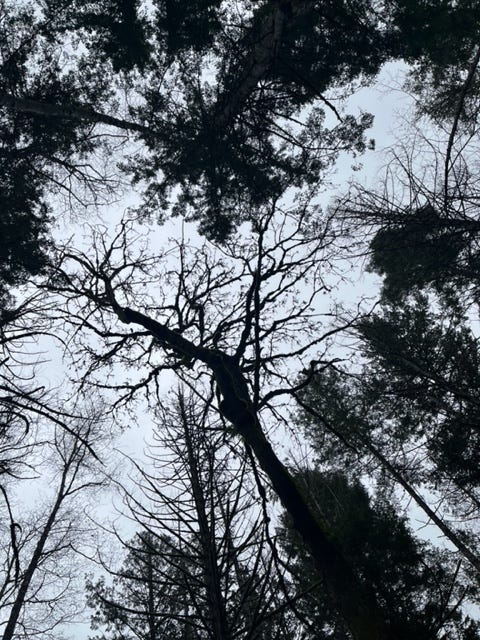Finding the colours of love
When my phone rang one morning last May, a woman I haven’t spoken to in forty-five years, a childhood friend of my first husband, Condé, was on the line. “I thought you’d want to know that Condé died last night,” she said.
It was kind of her to call.
I felt gutted. If you fall in love at fifteen and marry at nineteen, as I had, that person remains someone of significance. Condé and I had gone commercial fishing together, had adventures, and yet, when I developed a serious back issue, he’d announced the marriage was over. It was a lousy ending, but I’d made my peace with it long ago and I wished him well on his latest voyage.
Half an hour after the phone call telling me of Condé’s death, my phone pinged with a text from an old fishing buddy. “I thought you’d want to know…”.
Do we ever stop loving? I look at my lovely Kira dog, curled up by the woodstove, her head resting on a soft moose toy, and know that she’ll always be dear to me whether she’s on this plane or another. It makes me smile and feel tender to even think of my old dog, Otter, gone ahead to wherever we all flicker out and disappear to. Otter was and Kira is a Golden cross, both of them shaggy, sweet-tempered, around 80 pounds.
Certainly my feelings for Condé are more complex and ambiguous than for my dogs. I was taken aback at how much emotion his death evoked in me. After all, he was ancient history; I’d been married to Garney, my second husband, for thirty-seven years. Condé and I had kept in touch by email maybe once a year. We stayed on neutral topics. I hadn’t even known he was sick.
I still reverberated with how sudden Garney’s death had been; one morning he took the dog for a walk and never came back. After three years, though, my shock has been tempered with resignation and an enduring sense of affection.
There’s something that seems indecent about outliving two husbands while I remain here, plugging away. So much about death is surprising. I can see the inconsistency of saying this, I mean really, isn’t death something we all expect at some point? As a friend of mine, a doctor, was fond of saying, “The death rate for us all is 100%.”
And yet, looking at the flames through the tempered glass of the woodstove and at Kira, who’s moved to sprawl by my feet, I’ll stay with the accuracy of that word surprise. Possibly this comes from me being still alive, and people I cared about, parents, aunts and uncles, somewhere I can’t hug them anymore.
However, I have other family very dear to me who are still alive, and I’m blessed with friends.
It’s the end of January, night, with an arctic front descending on Pender Island. I look around at the reflection of lights in the windows, I hear the cello of Kaori Uemara playing from the kitchen and I go, Wow, here I am. Am I really aware of this moment? Here? Seated in the present?
As a writer, I taught my students that specific concrete detail is how to anchor a reader in any scene. I’m amused to notice that’s exactly what I’m doing when I ask myself if I’m really paying attention to the present. Here’s the flicker from two beeswax candles, one red, one a natural honey colour, both the actual candles and their reflections in the glass. I see the sheen of the burgundy leather couch with scratches on it from Einstein the cat, now long-gone. He wasn’t being destructive; at the time, the couch was his favourite place to curl up, the damage from his claws came just from turning around.
On a recent visit, my daughter said gently, “You’ve had that couch since I was in high school. Don’t you think it’s time you replaced it?” I put her off with some platitude, but part of me was protesting, It’s a really good couch! Your dad and I were proud of it. That couch is a tangible link with the past I’m hanging onto. The other reason that I am not rushing out to buy another couch, is that a conflicted part of me anticipates at some future point, I’ll be moving into a confined space for elders, or at least an older me. Which is not the slightest bit being present.
The truth is that change is the great human constant and I struggle with feeling, This change should not be happening. A friend gets bad news from her oncologist. On her behalf, I don’t want this. For me, grumpiness can be a clear sign I’m resisting what is.
Ultimately, all we can give is attention and love.
I send love to my friend with cancer and to her husband, to all my relatives alive and those no longer on the earth. I extend love to the living oceans, the rivers, the forests.
If I can take my sorrow, that anxiety of being in a world that’s under assault from climate change, and not minimize it or deny my feelings, but let them flow through me the way I’ve had to learn to do with human grief, then I create a channel, too, for Love to move through me, a torrent of tenderness and of valuing our natural world.
In no way does this let me off the hook from the human footsteps I have to take, such as making a meal for my friend or caring for the land where I live. That’s the physical reality. For me, though, under the surface of things I see a much greater and enduring spiritual reality. It’s my task to find within it the colours of love, and to work with that flow of magic and prayer.
How do you handle that tug of war between change that is happening and not wanting any part of it?








